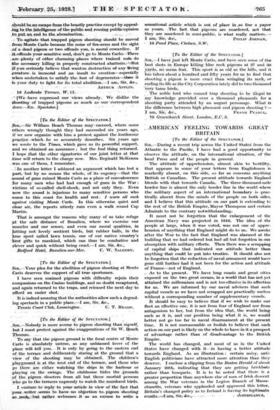_AMERICAN FEELING TOWARDS GREAT • - BRITAIN • • •
• • - [To the -Editor of the SPECTATOR.] Sin,—During a recent trill acrossthe United 'State:if from the Atlantic to the -Pacific; have had a good opportunity to observe the attibide, 'on the international situation, of 'the -local Preis and' of the people in general. • • The attitude- of--apprebension, almost- akin 4o •loStiltty, that appears in some ' of your - letters from Englishmen is -markedly absent,- on this--side, so far as concerns anything British or .Canadian. -The-present attitude towards England -blends with- that towards Canada. The three-thousand-mile border- line is almost the -only border -line in the world -where the military- aspect of an -international- boundary is • prac- .tically_ absent from the minds of the - people on both - sides, and I. believe that this attitude. on . our part is extending to the rest of the-British Empire,-Mayor Thompson and certain .Admirals to the contrary notwithstanding.
It must not be forgotten that the enlargement of. the American Navy was projected in 1918. The -idea - of.the people at large, when it was voted, was not one of appre- hension of anything that England might do to us.. We-awoke after the War to the fact that England was alarmed at the building that we had ordered but had all but-forgotten in our absorption with military efforts. Then there was a scrapping of capital ships that indicated our attitude better than anything that could be put into treaties. It should also not be forgotten that the reduction of naval armament would have gone still further had it not been for the action and attitude of France—not of England.
As to the present. We have long coasts and .great cities exposed on the two great oceans, in a world that has not yet attained the millennium and is not too effusive in its affection for us. We are informed by- our naval advisers that such capital vessels as we have not scrapped are practically useless without a corresponding number of supplementary vessels.
It should be easy to believe that if we wish to make our fleet an effective one, it is not from fear of England nor from antagonism to her, but from the idea that, the world being such as it is, and our position being what it is, we would better not go too far in naval disarmament at the present time. It is not unreasonable or foolish to believe that such action on our part is likely on the whole to have in it a prospect of advantage rather than of disadvantage to the British Empire.
The world has changed, and most of us in the United States have changed with it—in having a better attitude towards England. As an illustration : certain noisy, anti- English politicians have attracted more attention than they deserve. I enclose a clipping from the Boston Herald of about January 20th, indicating that they are getting brickbats rather than bouquets. It is to be noted that there is a greater proportion than anywhere else of men of Irish descent among the War veterans in the Legion Branch of Massa- chusetts, veterans who applauded and approved this letter. Britain's changed policy as to Ireland is having its legitimate AMERICA/ s.








































 Previous page
Previous page